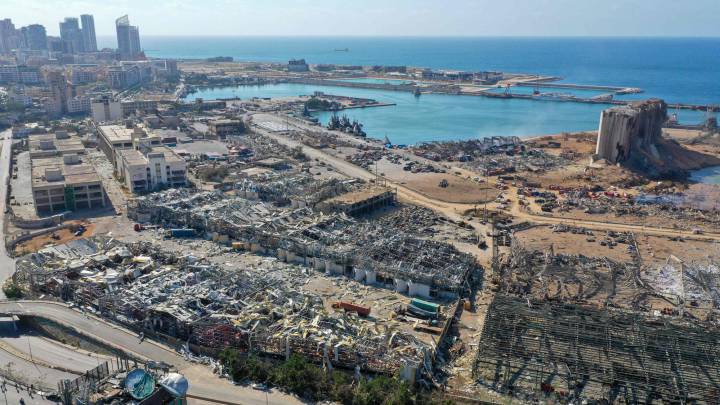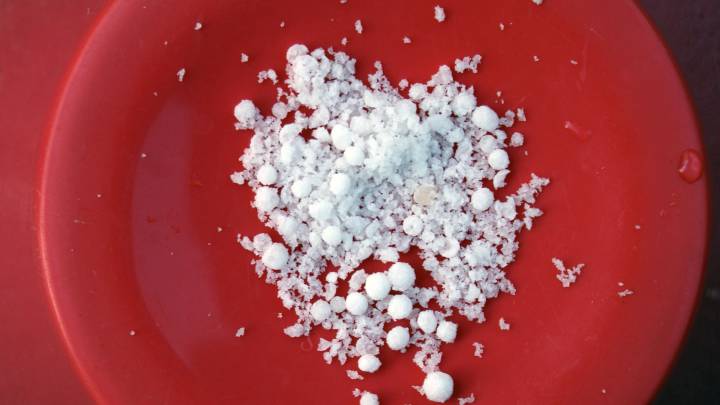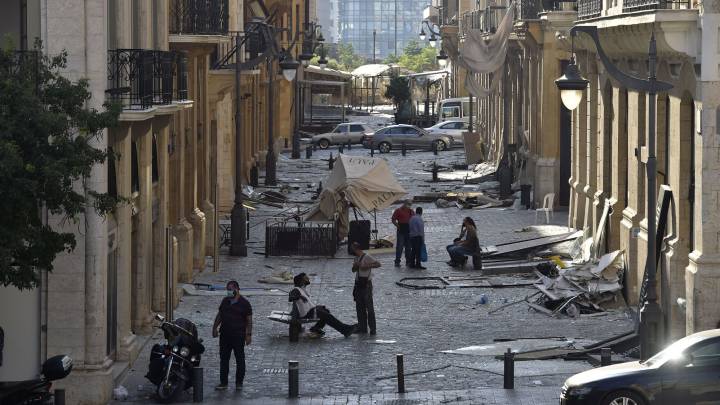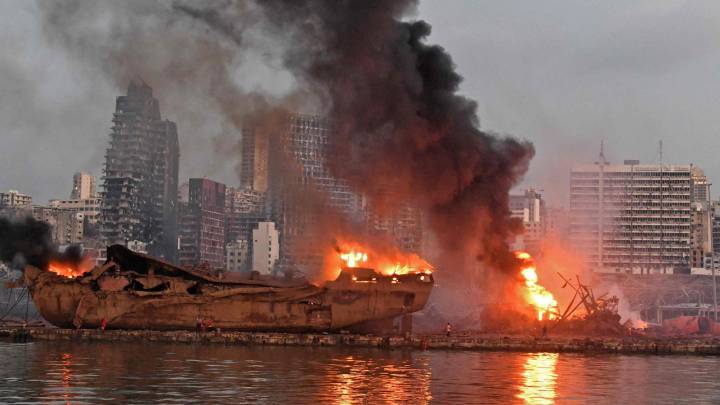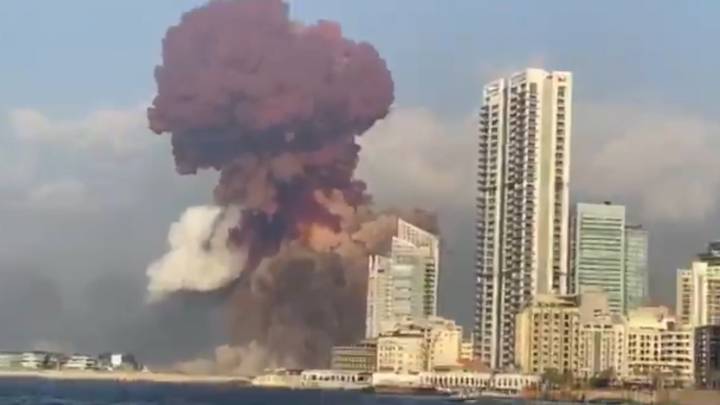Beirut explosion: news summary, Wednesday 5 August
Wednesday's news updates from Beirut, which was devastated on Tuesday afternoon by a huge blast, caused by the detonation of 2,750 tonnes of ammonium nitrate.
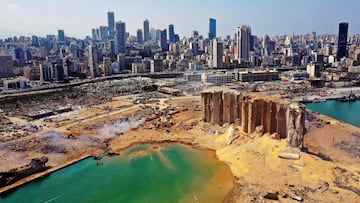
Show key events only
Beirut explosion: latest updates and breaking news 5/8/20
Stories related to the Beirut explosion
Other deadly explosions involving ammonium nitrate
The investigation into an explosion in the harbor of Lebanon’s port city of Beirut is focusing on how 2,750 tons of ammonium nitrate, a highly explosive chemical used in fertilizers, came to be stored at the facility for six years, and why nothing was done about it.
The explosion on Tuesday blasted a crater into the port and hit the city like a freight train, killing more than 100 people and injuring thousands. Buildings were damaged for miles around the city.
AP look at some other recent deadly explosions involving ammonium nitrate...
President Trump repeats conflicting message on explosion
Donald Trump was questioned about his statement that some “great generals” told him they thought that Tuesday’s explosion in Beirut was an “attack” involving “a bomb of some kind.” The query was on the back of Defense Secretary Mark Esper attempting to roll back the statement, saying he was “still getting information” on the blast in the Lebanese capital, but that “most believe that it was an accident, as reported.”
Once again, the president appeared to dangerously speculate on the basis that not everything about the incident was fully clear.
Heroes run towards the fire
This photo is said to be of a group heading towards the initial fire that was spreading, with the objective of limiting the damage that could be done. Then the main explosion happened.
Assessing the scale of the explosion
Although there are numerous reasons why this is not exactly what would happen in other cities, it possible gives people unfamiliar with Beirut an understanding of the area affected.
Eiffel Tower to go dark
The Eiffel Tower in Paris will turn off its lights at midnight tonight in solidarity with Lebanon, those who lost their lives, and those injured.
One American confirmed dead
“We offer our sincerest condolences to their loved ones and are working to provide the affected US citizens and their families all possible consular assistance. We are working closely with local authorities to determine if any additional US citizens were affected,” the embassy said in a statement Wednesday.
The embassy said all of its employees are safe and accounted for.

Crater from explosion is 124 metres in diameter
According to CNN, who analysed the satellite imagery, the crater has a diameter of 124 metres, with an accuracy of +/- 10 metres. For comparison the pitch at Real Madrid's Santiago Bernabéu is 105 metres long.
US Secretary of Defence: "It was an accident"
Mark Esper, the US Secretary of Defence said he believes the explosion was an accident and that the US had seen nothing to indicate otherwise.
Yesterday President Trump had talked of it being an attack, a position that has been walked back by Pentagon officials.
Esper also said the US was ready to give whatever aid was necessary.

The Rhosus eventually sank
According to Julian Röpcke, a Bild journalist, the captain of the Rhosus, the ship that brought the 2,750 tonnes of ammonium nitrate to Beirut, said she just eventually sank.

Emergency supplies being prepared in Tehran
Iran red crescent collect emergency equipment's stuff at the Mehr-Abad airport in Tehran. Iran has said it is sending a field hospital and emergency help aid to Beirut to help those injured and seriously wounded in the explosion.

Cleaning up
Volunteers are out cleaning up the streets across many parts of Beirut.
Seven-year-old ammonium nitrate shipment possibly caused Beirut explosion
More on the story of the Rhosus, the 2,750 tonnes of ammonium nitrate and the crew stuck on board in Beirut
The one fact we haven't been able to get definitive evidence for yet is where the Rhosus actually is now. Everything suggests she is moored either in or close to Beirut harbour, but it's not entirely clear that is definitely the case.

Crew kept as "hostages on a floating bomb"
An article from 2014 on FleetMon, a maritime news website, discussing the situation of the Rhosus, which was left "stranded in Beirut" loaded with "ammonium nitrate".
Beirut Governor: explosion leaves 300,000 people homeless
Beirut Governor on the effects of the explosion
This is a disaster in every sense of the word: 135 dead with the death toll expected to rise; 5,000 injured with a heath system already under terrible strain from Covid-19; 300,000 people made homeless with few resources to help them; and costs from the blast of three to five billion dollars in a country where the economy was already in a terrible state with the currency in freefall.
Buildings light up around the world in solidarity
The red, white and green of the Lebanese flag is being shown on buildings around the world, including Belfast City Hall and Tel Aviv City Hall. The Eiffel Tower has gone dark as an act of solidarity.
BBC journalist conducting interview at the moment of the explosion
Another shocking video of the power of the explosion.
21 French nationals injured in blast
The Prosecutor's Office in Paris has opened an investigation into the Beirut explosion on the grounds that 21 French nationals were injured in the blast. This is standard procedure when French nationals are killed or injured abroad.

UK ammonium nitrate guidance
The UK's Health and Safety Executive's handbook to safely handling ammonium nitrate. Lots in this, particularly ensuring the storage is correct and that the ammonium nitrate is not exposed to fire.
Blast interrupts wedding photoshoot
Another video that has gone hugely viral is this footage of a bride just as the blast hits. What hasn't been so widely shared is that the couple were unharmed.
Ammonium nitrate facts: why is it so dangerous
Ammonium nitrate facts
An explainer on ammonium nitrate, 2,750 tonnes of which exploded at the docks in Beirut.
"This is probably up there among the biggest non-nuclear explosions of all time," says Roland Alford, managing director of Alford Technologies, a British company that specialises in disposal of explosive ordnance.
#OurHomesAreOpen
Hundreds of Lebanese are offering shelter to people displaced by the blast, using the hashtag #OurHomesAreOpen on social media.
According to Beirut's governor more than 300,000 people's homes are currently too damaged to live in.
Using the hashtag #OurHomesAreOpen in both Arabic and English, social media users have freely offered up spare beds and empty properties to victims, providing their names, phone numbers and details on the size and location of the accommodation.
"I wanted to do something about it, I was going crazy," said the founder of the platform ThawraMap, originally used to identify protest locations, which is curating a list of available beds, including free accommodation from hotels.
"Today a lot more people are going to be homeless. They go to their family or friends for a day or two and then what are they going to do?" the anti-government activist told the Thomson Reuters Foundation, who declined to publish his name for safety.
135 people confirmed dead
Lebanon's Health Minister Hamad Hassan said 135 people are now confirmed to have died as a result of yesterday's explosion, but also confirmed there will be victims under the rubble. He also said there are many people missing in the wake of the blast.
In total 5,000 people were wounded, Hassan confirmed, up from 4,000 earlier in the day.

The explosion
This combination of stills from video footage shows the huge, second explosion, of the ammonium nitrate, which was detonated by the fire that can be seen in the first image.

The Rhosus
This is an undated file photo, made available by Tony Vrailas, of the Rhosus, the vessel which is suspected of having brought the 2,750 tonnes of ammonium nitrate to Beirut, before it was impounded when the owner of the vessel allegedly abandoned it.

Czech USAR personnel en route to Beirut
Czech Urban Search and Rescue (USAR) personnel about to board a plane at the Vaclav Havel Airport in Prague, Czech Republic. The Czech Republic is sending 37 search and rescue experts and 5 dogs to Beirut to help with the rescue mission. 100 people are known to have died in Beirut but many are thought to be trapped under rubble and the death toll is expected to rise.

Two-week state of emergency declared in Beirut
The Lebanese government, at their cabinet meeting this afternoon, has declared a two-week state of emergency in the capital. This will give the military full powers.
Music among the devastation
This is being widely shared on social media. "This city doesn’t give up and keeps rising from the ashes" said one sharer.
Footage from inside a destroyed office building
One of our colleagues used to work in this building, which is a 5 minute walk from the docks. Thankfully nobody was hurt, because the office was shut due to the coronavirus.
Port officials under house arrest
Lebanon's government has placed all port officials involved in storage and security since 2014 under house arrest. The ammonium nitrate is said to have been impounded in 2013.
"There are officials who will stay in their homes in the coming days, pending the conclusion of the investigation and the results being issued. The house arrest will include those who took part in the storage, guarding and investigating of Hangar 12 from 2014 until today," Ghada Shreim, Lebanese Minister of Displaced People, told reporters at the end of today's cabinet meeting.
Hangar 12 was where the ammonium nitrate was stored, the fire appears to have started in Hangar 9. The first, small, white-smoke explosion, may have been a consignment of fireworks in or near Hangar 9.
Health care system in Lebanon already in crisis over Covid-19
Health minister Hamad Hassan confirmed the explosion has only added to the ongoing crisis in Lebanon's health care system, which is struggling with the coronavirus pandemic.
The situation "requires everyone to engage positively from politicians, political parties, authorities, and from all friendly and brotherly countries because we suffer from a shortage in the number of beds and a lack of equipment to help injured people and those are in critical conditions," Hassan said.

Beirut weather
The weather in Beirut is set fair for the next 14 days. Highs most days are around 30, with temperatures dropping to 23 at night. With thousands likely needing to be housed in shelters or tents the longer the weather holds the better.
Drone footage of explosion damage
Footage from CNN of the effects of the explosion. The damage caused is estimated at between three and five billion dollars. There are over 100 people dead and 4,000 injured, with the death toll expected to rise. 300,000 people are currently homeless.
Firefighters responding to initial fire all killed
A team of firefighters who were responding to the initial fire at the port - thought to be a container of fireworks - were all killed when the ammonium nitrate detonated. As yet we do not have details of the firefighters who lost their lives.

More than 300,000 people displaced
Beirut's governor has now said over 300,000 people have been displaced from their homes by Tuesday's blast, up from his previous estimate of 200,000 to 250,000.
"Half of Beirut's population have homes that are unliveable for the foreseeable future — for the next two weeks," he said in an interview with Jordan's state-owned broadcaster Al Mamlaka.
Tracking the ammonium nitrate
Thread from Mark Urban, the BBC's Diplomatic Editor for flagship show Newsnight, confirming that Lebanese officials impounded the ammonium nitrate which was then left for years despite the risk and the fact it was decomposing.
He says experts believe it is highly likely that the explosion was provoked by a fire in a quayside container of fireworks. As can be seen in the footage of the original fire, before the huge explosion, there is white smoke, and within that many small bright explosions with multiple bangs, consistent with fireworks going off. The detonation of the ammonium nitrate gives rise to red smoke after the mushroom cloud has gone.
Smoke visible from 50 kilometres away
As has also been noted the blast was audible in Cyprus, some 150 kilometres away. Estimates have put the blast at being equivalent to 2.0–2.2 kt of TNT, possibly the sixth biggest ever non-nuclear explosion.

Head of Beirut port says letters were sent over ammonium nitrate
The head of Beirut port and the head of customs have both said that several letters were sent to the judiciary asking for the dangerous material be removed, but no action was taken.
Port General Manager Hassan Koraytem told OTV, a broadcaster, that the material had been put in a warehouse on a court order, adding that they knew then the material was dangerous but "not to this degree".
"We requested that it be re-exported but that did not happen. We leave it to the experts and those concerned to determine why," Badri Daher, director general of Lebanese Customs, told broadcaster LBCI.
"Nothing was done" to fix ammonium nitrate risk
Reuters are reporting that an unnamed official source has confirmed that there had been years of inaction around the 2,750 tonnes of ammonium nitrate stored at the port.
"It is negligence," the source is reported to have said, adding that the issue had been discussed at committees and before judges but "nothing was done."
The explosion was caused by a fire in warehouse number 9 at the port, which spread to warehouse number 12 where the ammonium nitrate was stored, the source added.
As mentioned below, the ammonium nitrate was reportedly confiscated from a cargo ship which was abandoned in the port in 2013, either over money or seaworthiness issues.
Reports of confrontations in central Beirut
There are reports of violent confrontations in the centre of the city between citizens and forces loyal to the former prime minister Saad Hariri. There was huge anger across Lebanon at the extremely wealthy ruling class before the explosion.
Ammonium nitrate believed to have been brought in on cargo ship the Rhosus
The Guardian's correspondent in Russia has some story on the ship that supposedly brought the 2,750 tonnes of ammonium nitrate to Beirut. The ship was sailing from Georgia to Mozambique in 2013 but was prevented from leaving over an unspecified dispute. Owner Grechushkin is said to have walked away at that point, abandoning the ship and its crew. The ammonium nitrate ended up being confiscated and held in the warehouse where it eventually exploded.

Clean-up operation
A helicopter over the blast site working to put out the fires that are still smouldering so that the clean-up operation can get underway.
UN Secretary General offers condolences
The UN High Commissioner for Refugees, Filippo Grandi, has also said the agency stands "in solidarity with people of Beirut and Lebanon in these tragic and testing times."

Shattered glass
Windows were broken across the city up to 10 km away from the explosion. Just replacing the glass alone across the city is going to be a mammoth task...
Pentagon officials walk back Trump's claims
US President Donald Trump yesterday said the Beirut explosion appeared to be a terrible attack that had been carried out using a "bomb of some kind", saying he had discussed the matter with his "great generals".
Pentagon officials have now told CNN they have no idea what he was talking about and that there is no indication that it was an attack of any sort.
Head of Beirut's port says they knew materials were dangerous
Sky News is reporting that the head of Beirut's port has told local TV that they were aware the materials stored were dangerous, "but not to this extent". He says no explosives were stored near the blast site.
Meanwhile Reuters is reporting that another port employee has admitted that an inspection team had looked at the ammonium nitrate and said that if it was not moved it could "blow up all Beirut".
Storing ammonium nitrate amounted to "criminal" behaviour
Worth reading this brief interview with Jad Chaaban. "There is exasperation on the streets and there is a lot of anger", he says about the anger that was already there in Lebanon with the ruling class, before the explosion.
90% of Beirut hotels damaged
According to the Lebanese Hotel Federation some 90% of the establishments in Beirut have suffered some damage from the blast.
EU pledges support
The EU is to send "over 100 highly trained firefighters, with vehicles, dogs and equipment, specialised in search and rescue in urban contexts" to Beirut to help with the rescue mission in the aftermath of the explosion, EU Commissioner for Crisis Management Janez Lenarcic says.
The EU has activated its Civil Protection Mechanism, which allows the bloc to coordinate aid from the member states.

Fact-checkers on the Beirut explosion
If you're looking at Twitter right now, you might be seeing this report, saying the fact-checkers at Vice and Lead Stories have been looking at the explosion and have concluded it was not a nuclear blast. They do not appear to be taking a view on the official statement that it was badly stored ammonium nitrate.
There are some theories doing the rounds that there may have been explosives involved, although in general there does not appear to be a major debate at the moment over the main component of the blast being ammonium nitrate.
That said, Danilo Coppe, an explosives expert in Italy, has said he does not believe the blast was caused by ammonium nitrate. He says the ammonium nitrate smoke is yellow, while the smoke from the blast in Beirut was red and orange.
"What's more", he said, "it was not 2,700 tonnes that exploded, because if it had been 2,700 tonnes that would mean 100 containers of ammonium nitrate. And 100 containers do not explode simultaneously like that. Anything is possible in this life, but I don't think it was ammonium nitrate that exploded."
A moment of hope amidst the destruction
Across Beirut people are scrambling to pull people from under rubble.

Grain silos destroyed
The silos destroyed at the port contained around 85% of the country's grain. All the wheat is unusable. Seven employees who worked in the silos are missing.
Instagram account to help locate people in Beirut
The account lists missing people and also people who have been admitted to hospital.
Satellite images of blast crater
You can also clearly see the destruction wrought in the surround area.

Damage estimated at billions of dollars
Beirut's governor, Marwan Abboud, says the damage from the explosion is estimated at between three and five billion dollars. "Beirut has become a devastated city... half of it destroyed and hundreds of thousands of residents will not be able to return home for two to three months."
The explosion has come with the Lebanese economy already facing its worst crisis in decades. The currency is in free-fall, having lost some 90 per cent of its value since September, and the country is also struggling to deal with the effects of the shutdown for the coronavirus. There have been 5,062 confirmed cases of the disease in the country and 65 deaths, according to figures compiled by the Johns Hopkins University.
Cabinet calls emergency meeting for this afternoon
It's worthwhile following @Leila_MA if you are keeping up to date on the situation on the ground in Beirut.
She reported that the blast sounded like a jet plane "breaking the sound barrier" and that the explosion caused a "blinding white light and ripped the doors and windows" out of her apartment. She was also injured in the blast, needing stitches in her foot.
Offers of aid
Numerous offers of aid have been made to Lebanon, with France, Turkey and the Gulf states among the countries offering help in the aftermath of the Beirut explosion.
France has offered 55 security personnel, along with six tonnes of health equipment and 10 emergency doctors.
"France is always on the side of Lebanon and the Lebanese people. It is ready to offer assistance depending on the needs expressed by Lebanese authorities," Foreign Minister Jean-Yves Le Drian said on Twitter.
Turkey's Humanitarian Relief Foundation (IHH) is helping in the search for survivors, digging through debris to look for people and recover bodies, while the group has also set up a kitchen to help provide food to those in need at a Palestinian refugee camp.
Kuwait has sent medical aid and other essentials, while the Kuwaiti Red Crescent said it would offer whatever help was needed.
Russia has said it will send five planes of medical equipment, a field hospital and medical staff, along with personal protective equipment in light of the Covid-19 pandemic.
The Netherlands is sending a specialised search and rescue team to Lebanon consisting of 67 doctors, nurses, firemen and police officers to assist in the search for survivors trapped under rubble.
Iran has promised to send medical aid to provide necessary treatment to the injured.

Before and after
AFP have published this combination of pictures, showing how the harbour looked back in 2017 and the aftermath of the explosion, with a ruined ship still in flames.
Up to a quarter of a million people left homeless
Beirut governor Maruan Abboud has said that between 200,000 and 250,000 have been left homeless by the explosion. "We are working to give them food, water and shelter," said Abboud.
The Red Cross have set up temporary shelters in Beirut for 1,000 families, offering food, hygiene kits and basic needs to house the families for 72 hours.
The blast site
The structure near the top of the photo is the remains of a grain silo, which supplied wheat to the city. Flatbread made of wheat is a diet staple in Beirut and finding sufficient wheat over the coming days is going to be another major part of this emergency for the government.
100 people killed and 4,000 injured in Beirut
The Red Cross have said at least 100 people have been killed by the explosion and 4,000 injured. Lebanon's health minister has also said that hundreds are reported to be missing, raising fears the death toll will rise.
Four of Beirut's hospitals were damaged in the blast and are currently out of service, with the remaining hospitals swamped by casualties.
Lebanon's Health Ministry said it was working on a plan to set up six to eight field hospitals, with Qatar, Iran, Oman and Jordan all donating equipment.
Beirut ammonium nitrate explosion kills 100 and leaves over 4,000 injured
2,750 tonnes of ammonium nitrate caused explosion
Despite initial speculation that a bomb was the cause of the huge explosion at the port in Beirut, the Lebanese president, Michel Aoun, confirmed that it was caused by the detonation of 2,750 tonnes of ammonium nitrate, which had been unsafely stored at the port.
According to the President it had been stored there for six years, and he vowed that those responsible would face severe consequences.
Ammonium nitrate is mostly used as a fertilzer (it releases nitrogen which plants need, particularly when growing) but also as a component of explosive mixtures for mining and quarrying, because it is a powerful oxidant, releasing oxygen directly into a chemical reaction making it more powerful. It can also, as appears to have happened in Beirut, explode violently on its own when detonated, in this case by a fire.
Huge explosion rocks Beirut port
The moment of the explosion
Widely shared on social media, this is the moment of the blast, which caused a mushroom cloud and a massive shockwave, which caused major damage across Beirut and could be heard as far away as Cyprus, 150 miles away.
The blast caused seismic waves the equivalent of a 3.3 magnitude earthquake, although experts noted that because the explosion happened above ground most of the energy is released into the sky and buildings - had the explosion happened underground the magnitude would have been far higher.

Latest news from Beirut
Hello and welcome to our coverage of the aftermath of yesterday's huge explosion in the port in Beirut. The city has been devastated by the massive blast that occurred at 18:07 local time, and which has killed at least 100 people and left more than 4,000 injured.
The explosion destroyed buildings in and near the port, flipped vehicles, shattered glass across the city and damaged buildings up to 10 kilometres away.
